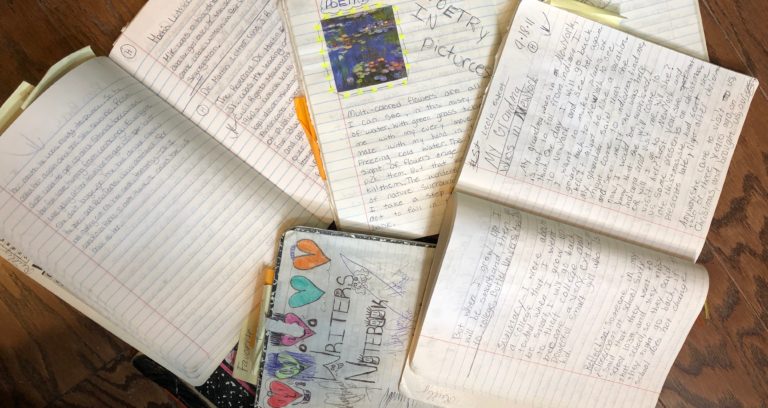by Julie Patterson

Perhaps our most important short-term goal for writing students is to maintain stamina and excitement for writing. Get and keep them working in writers’ notebooks to achieve this—even if it means inviting them to make new ones at home.
Writers can focus on collecting and nurturing ideas for writing projects in their notebooks. You can encourage and support this work using several different strategies:
1. Remind students that their notebooks are already filled with possible writing ideas.
Direct them back to a heart map exercise that you did, for example, or entries where they already made lists of potential writing topics. Ask students to choose an idea from one of those lists and write for 10, 20, or 30 minutes—as appropriate for their age and experience level.
If students are accustomed to writing for 30 minutes in your classroom, you might dial at-home expectations back to 15 or 20 minutes. Encourage students/caregivers to set a timer and keep their pens moving until it chimes.
2. Provide some prompts to get students thinking like writers.
As teachers we often balk at the word “prompt,” but we’re not talking about the kinds of prompts commonly found on standardized tests. We’re talking about strategies for uncovering writing ideas from your own life, the kinds of things you teach in minilessons at the start of a unit of study, for example.
For the short term, you might worry less about what genre you’re teaching and provide a wide variety of strategies so that all students can find something to motivate them away from your writing community. Here are some sources to help you:
3. Share author interviews (video, audio, and/or written) that feature authors your students will recognize talking about how they get ideas for their writing projects.
You can often find these on author websites, so check the sites of authors you know your class will recognize by name. You can also search online for “author interview Jacqueline Woodson,” for example.
Of course, at some point you will likely be asked to assess the work done remotely. We’ve got you covered there, too. Check out “How to Assess Writers’ Notebooks” from the Resources section of our website.
As we all shift to teaching online during the COVID-19 crisis, the Partnership for Inquiry Learning is working to support you in reconceptualizing what your reading, writing, and math workshops might look like. We encourage you to keep in mind, however, that this emergency shift to e-learning is different in many ways than we might expect to see in a course intentionally designed for online delivery. In some cases, pedagogical best practices might be superseded by the realities of what’s actually possible during an unprecedented pandemic. We encourage you to keep this in mind as you plan for your own classes.
